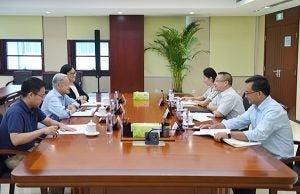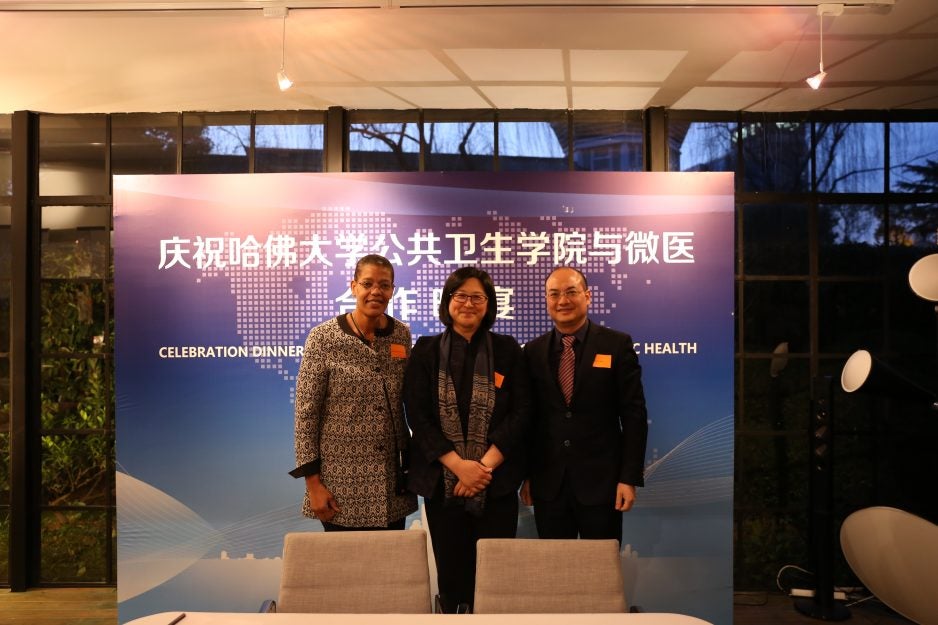2018年9月20日下午,国家医疗保障局局长胡静林会见了美国哈佛大学公共卫生学院讲席教授萧庆伦(William Hsiao)。
Professor Winnie Yip Coins “21st Century Barefoot Doctors”
Fifty years ago, during the Cultural Revolution in China, a cadre of “barefoot doctors”—some 1.5 million peasants who received intensive three- to six-month training in anatomy, bacteriology, birth control, maternal and infant care, and other topics—were dispatched to provide basic health care for their rural communities. Even in the midst of the revolution’s social upheaval, this low-tech medical corps (named for the fact that many worked in their own rice paddy fields when they weren’t tending to their neighbors) was highly successful, significantly reducing infectious disease and boosting life expectancy.
Harvard Chan School signed an MOU with Meridian Medical Network Corp to explore AI opportunities in enhancing care delivery in China
Through this collaboration, both parties will design, implement and evaluate People-Centered Integrated Care models through improved financing and provider payment incentives and the use of big data and AI service platform with the goal to improve quality, efficiency and affordability of health care.
Professor Yip joined a field visit on supervision of Analysis of Provider Payment Reform on Advancing China ’s Health (APPROACH) Project in Cengong County, Guizhou Province
On May 17, Dr. Winnie Yip, Professor of the Practice of International Health Policy and Economics at the Harvard T.H. Chan School of Public Health and Dr. Ramesh Govindaraj, Lead Health Specialist of Health, Nutrition and Population Global Practice of the World Bank, conducted a supervision field visit to the Provider Payment Reform on Advancing China ’s Health (APPROACH) project site at Cengong county in Guizhou province.
CHP initiated a collaborative project with Tongreng Prefecture in Guizhou Province to build an integrated health care delivery system enhanced by AI-assisted diagnoses and treatments and appropriate provider payment incentives
A one-day workshop was held to discuss the project. Participants of the workshop included directors of the county and township hospitals, government officials in charge of the New Cooperative Medical Scheme (NCMS) Program from 10 counties in Tongren, and representatives from Meridian Network Corp, a health care AI (artificial intelligence) company. Professor Winnie Yip presented the payment reform plan.
2018 China Hospital Development Conference (Professor William Hsiao)
On May 12, Professor Hsiao attended the 2018 China’s Hospital Development Conference and gave a keynote speech in the opening ceremony to about 1,200 hospital directors from across China. The conference is organized by DXY (in Chinese:丁香园), a major social media platform for physicians and other health practitioners in China.
Harvard China Health Research Collaborative Established
On March 16, 2018, the Harvard Chan School formed the Harvard China Health Collaborative Partnership with seven peer institutions in China. Dean Michelle Williams and Professor Winnie Yip, the Director of China Health Partnership, attended the signing ceremony in Beijing.
Harvard Chan School and WeDoctor Group signed MOU to launch a series of initiatives to improve affordability, accessibility and effectiveness of care delivery in China
Since 2009, China has launched a series of health care reforms that are visionary and ambitious. To help China achieve its goals, Harvard Chan School and WeDoctor Group signed an MOU which is intended to outline how their collaborative efforts could improve healthcare access to primary care, disease prevention, and medical poverty alleviation for all people in China by 2030.
Harvard Researchers Work to Fill Gaps in Chinese Health Care
On December 18, 2017, The Harvard Gazette published an article featuring Professor Winnie Yip and her colleagues’ work on China. (Photo Credit: Kris Snibbe/Harvard Staff Photographer)
Winnie Yip elected 2018 president of International Health Economics Association
IHEA’s mission is to increase communication among health economists; foster a higher standard of debate in the application of economics to health and health care systems; and assist young researchers at the start of their careers.










